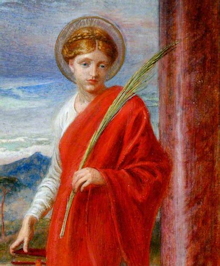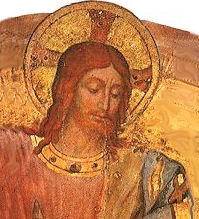Make your gift today!
Help keep Catholics around the world educated and informed.
Already donated? Log in to stop seeing these donation pop-ups.
Advent: December 2nd
Tuesday of the First Week of Advent
Other Commemorations: St. Bibiana, Virgin and Martyr (RM); St. Silverius, Pope and Martyr (RM)
» Enjoy our Liturgical Seasons series of e-books!
In the General Roman Calendar, this date is a weekday in Advent. No feast of a saint is celebrated. Before the reform of the Roman Calendar in 1969, this was the memorial of St. Bibiana, virgin and martyr, who, together with St. Agnes and St. Cecilia, is one of the virgin martyrs held in particular veneration in Rome. Her feastday is no longer on the General Roman Calendar, but has been transferred to particular calendars.
The parents of the human race, Adam and Eve, disobeyed God's command in the Garden of Eden, thereby commiting the original sin, resulting in the closing of the gates of Heaven to mankind.
Even after this sin, man was not abandoned by God. God promises a Messiah and Redeemer: "I will put enmities between thee and the woman, and thy seed and her seed: she shall crush thy head, and thou shalt lie in wait for her heel (Gen 3:14)." He tells us of a "New Adam" who will have victory over sin.
This victory of Christ has given us greater blessings than those which sin had taken from us. God permits evil in order to draw forth some greater good: "O Happy Fault, whereby we have merited so great a Redeemer (Exsultet)."
Symbols: tree, man and woman.
Suggested Readings: Genesis 3:1-7, 9, 14-29, 23-24.
St. Bibiana
 St. Bibiana was a Roman who was martyred during the time of Julian the Apostate. A legend states that Bibiana's parents, Flavian and Dafrosa, were devout Christians as well. Dafrosa was beheaded, and Flavian, who was a former Roman prefect, had his face burned with a hot iron and was exiled. Bibiana and Demetria, her sister, were forced to remain in their house after all their possessions had been taken from them. For five months the two sisters fasted and prayed. When they appeared in court, Demetria died on the spot, and the judge handed Bibiana over to a woman named Fufina. This woman tried to tempt Bibiana to be unfaithful to Christ, but her efforts were in vain. Bibiana was scourged to death with whips that were loaded with lead. Her corpse was left out in the open for dogs to eat, but no dogs touched it, and fter two days a priest named John took the body at night and buried it. St. Bibiana is one of the three virgin martyrs particularly venerated in Rome, the other two being St. Cecilia and St. Agnes.
St. Bibiana was a Roman who was martyred during the time of Julian the Apostate. A legend states that Bibiana's parents, Flavian and Dafrosa, were devout Christians as well. Dafrosa was beheaded, and Flavian, who was a former Roman prefect, had his face burned with a hot iron and was exiled. Bibiana and Demetria, her sister, were forced to remain in their house after all their possessions had been taken from them. For five months the two sisters fasted and prayed. When they appeared in court, Demetria died on the spot, and the judge handed Bibiana over to a woman named Fufina. This woman tried to tempt Bibiana to be unfaithful to Christ, but her efforts were in vain. Bibiana was scourged to death with whips that were loaded with lead. Her corpse was left out in the open for dogs to eat, but no dogs touched it, and fter two days a priest named John took the body at night and buried it. St. Bibiana is one of the three virgin martyrs particularly venerated in Rome, the other two being St. Cecilia and St. Agnes.
Patronage: against epilepsy; against hangovers; against headaches; against insanity; against mental illness; epileptics; mentally ill people; single laywomen; torture victims; archdiocese of Los Angeles, California; Bibiana, Italy
Symbols and Representation: pillar; branch of a tree; dagger; scourge; column and scourge with leaded thongs
Highlights and Things To Do:
- Saint Bibiana lost everything except her faith. Say a prayer for those you know who are grieving the loss of loved ones, homes, jobs, health or some other tragedy.
- Read more about St. Bibiana:
- Saint Bibiana has a church in Rome named after her. See:
- Saint Bibiana's relics are enshrined in the Cathedral of Our Lady of the Angels, Los Angeles, California.
Pope St. Silverius

When news of Agapitus' death reached Rome, King Theodahad, fearing the imminent Eastern invasion, was determined to have a pro-Gothic ally on the throne of Peter. Silverius, son of the glorified Pope Hormisdas, was his candidate. The clergy reluctantly submitted to the will of their king and elected the subdeacon, accepting him only for the sake of unity. The destiny of this pope, however, would not follow the same glorious path as that of his father.
While Silverius was being consecrated in Rome, the emperor's wife Theodora was making her own plans to reinstate the Monophysite, Anthimus, as patriarch of Constantinople. Striking a bargain with the chosen successor of Boniface II, Vigilius (who had been serving as nuncio to Constantinople), the empress packed him off to Rome, promising him the papacy in exchange for the heretic's rehabilitation. But by the time Vigilius reached his destination, Silverius was already tending to the needs of the Apostolic See.
The emperor's general Belisarius now marched on Rome. As the Eastern army drew near, the Romans looked to their pope for advice. Silverius, realizing that resistance would be fruitless, recommended surrender. In early December of 536, as a triumphant army occupied Rome, Belisarius summoned the pope to his quarters. Theodora had been adamant with the general—the pope must submit to her wishes or face dire consequences. The general's first tactic with Silverius failed. Using forged letters, Belisarius had accused the pope of treason on the grounds that he had allowed the city's gates to be opened for the retaliating Goths, now led by King Witiges. The general ordered Silverius to concede to the empress by reinstating Anthimus as patriarch and giving in to the Monophysite doctrine. Silverius adamantly refused. Belisarius took no chances the second time; he seized the pope and, stripping him of his pallium, deposed the protesting Silverius, now clothed only in a monk's habit. The clergy was then notified by a subdeacon of the pope's terrible treatment and sentence of banishment. When the general ordered the election of a new pope, the ambitious Vigilius was well prepared. Through coercion Belisarius and Vigilius successfully accomplished the nomination and election of the latter by the clergy.
Silverius had been deported to Patara, a seaport in Lycia. The local bishop was so distressed that he personally went to Constantinople to plead with Justinian, telling him that Silverius had been unjustly accused and, more, unjustly exiled. The emperor believed there might be some merit to this and ordered Silverius back to Rome to face a fair trial. Moreover, he ordered that, if found innocent, Silverius was to be given back his throne. Vigilius panicked, and as soon as Silverius reached Rome, the new pope ordered his removal to Palmaria, an island in the Gulf of Gaeta. It was on this island that Silverius was forced to submit his abdication. After suffering torture and starvation, Silverius died, a martyr for his Church.
Silverius was buried on the same island of his exile, his grave becoming the center of miraculous healings.
—Excerpted from The Popes: A Papal History, J.V. Bartlett
Patronage: Ponza, Italy; Valprato Soana, Italy
Highlights and Things To Do:
- Read more about St. Silverius:
- The island of Ponza, Italy claims patronage to San Silverio, and this devotion was brought over to the USA. See the San Silverio Shrine in Dover Plains.
- People who came from Ponza settled in the Morrisania section of the Bronx, New York. There they have an annual Festival of San Silverio at Our Lady of Pity Church on 151st Street and Morris Avenue, honoring San Silverio. See A tradition from Ponza and a Family Tradition.






